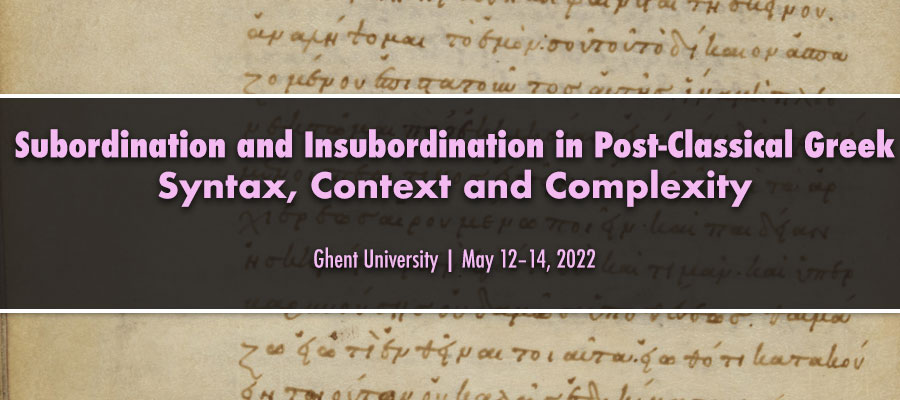Subordination and Insubordination in Post-Classical Greek: Syntax, Context and Complexity, Ghent University, May 12–14, 2022
The noted absence of grammars dealing exclusively with the syntax of the various phases of Post-Classical Greek (Lee 2007: Early III-I BCE, Middle I-III, Late IV-VI) has recently generated an increasing amount of studies dealing with the Post-Classical syntax of subordination and insubordination. While Post-Classical Greek has received less scholarly attention than other periods of the Greek language, significant progress has been made in the past few years, resulting in extensive contributions focused on the specificities of Post-Classical Greek (Rafiyenko & Seržant 2020; Bentein & Janse 2020). On a syntactic level, many studies have dealt with changes in subordinate strategies characteristic of Post-Classical Greek such as from non-finite to finite subordination (Joseph 1983; Fykias & Katsikadeli 2013; Kavčič 2017), the confusion of moods (Leiwo 2017), different strategies of relativization (Hayes 2018; Bentein & Bagriacik 2018) and final and consecutive clauses (Di Bartolo 2021). More recently, the syntax of Post-Classical insubordination, the diachronic conventionalisation of formally subordinate clauses as illocutionary independent main clauses, has been added to this field (La Roi 2021, La Roi forthc.).
Moreover, the opportunity to analyse and compare for this period both literary and non-literary (particularly papyrological) material has stimulated an interest in combining Post-Classical Greek texts with a variety of sociolinguistic approaches (Bentein 2019; Bentein & Amory forth.): similarly to complementation (Bentein 2017), also subordination strategies can show correlations with social and pragmatic factors of language use. Alternatively, hierarchical structures such as subordinate clauses can be investigated in order to measure the syntactic complexity of a text, although the correlation between subordination and complexity is not straightforward (Schleppegrell 1992). In this sense, studies have argued for a more nuanced analysis based not only the frequency of subordinate clauses, but also on their types and functions in different communicative settings (Beaman 1984; Thompson 1984). The presence of subordination as an index of syntactic complexity has also found application to Post-Classical Greek registers (Kälviäinen 2013; Bentein & Cattafi forthc.).
The main aim of this conference is therefore to investigate from different perspectives the specificity of subordination as a syntactic phenomenon in an expanding research area of the Greek language, and, at the same time, to stimulate debate around the relationship between subordination, linguistic complexity and sociolinguistic characterization in historical corpora. Topics of particular interest are:
- Conceptualizing subordination: new approaches to the notion of (in)subordination, the application of different theoretical frameworks to Greek subordinate clauses, typological parameters of (in)subordination (e.g. deranking, balancing, de-activated illocutionary force), cross-linguistic differences with Post-Classical Greek;
- Forms and functions of subordination: the different strategies of subordination and insubordination in Post-Classical Greek, the linguistic variation within subordinate clauses (e.g. moods, tenses, particles) and the syntactic-semantic integration of the subordinate into the main clause;
- Measuring subordination complexity: the role of subordination in determining linguistic complexity, the methodological approaches to assess the complexity of a Greek text and the use of new computational tools (e.g. Diorisis corpus, EVWRIT database, PapyGreek) for the analysis of Post-Classical syntax;
- Subordination in context: the diachronic evolution of subordination in the Greek language, the distribution of subordinate clauses across registers and text types (e.g. literary vs non-literary), the variety of social and pragmatic meanings expressed by the different (in)subordination strategies.
